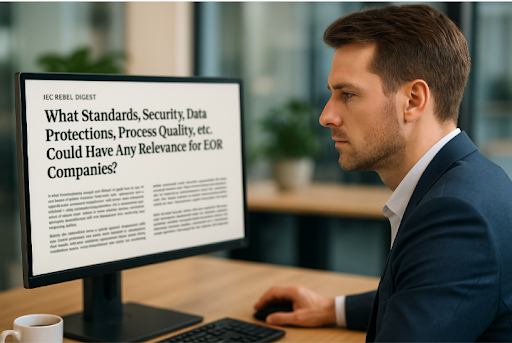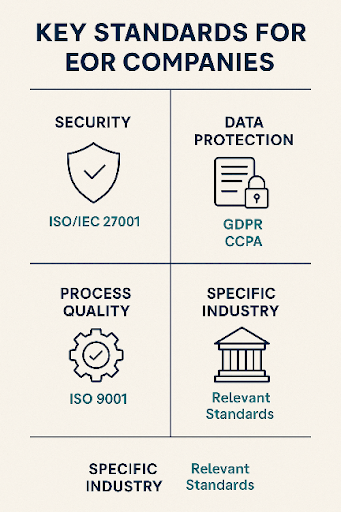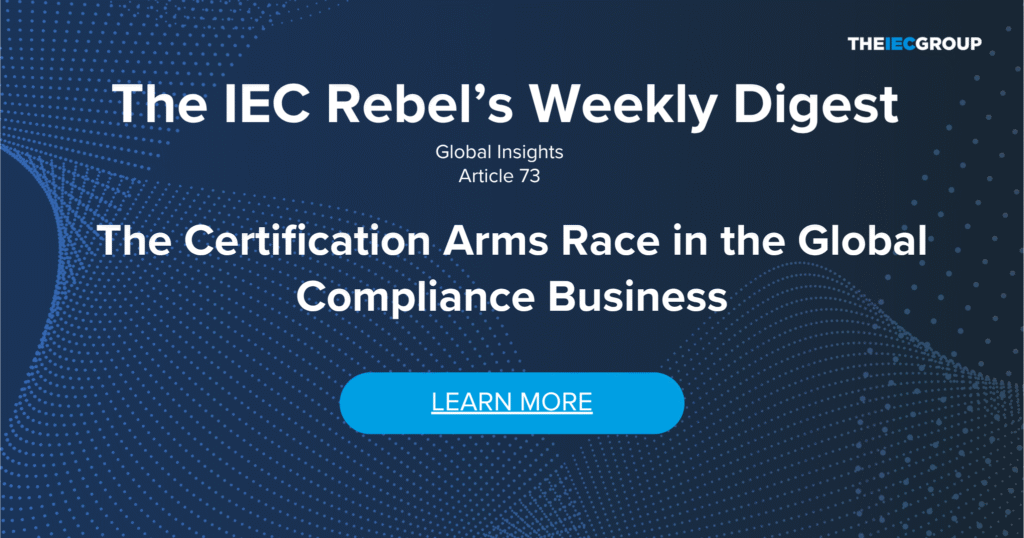The Certification Arms Race in the Global Compliance Business
What Standards, Security, Data Protections, and Process Quality Matter for EOR Companies?
 Let’s be clear: compliance isn’t a badge of honor for Employer of Record (EOR) companies – it’s their business model. In an industry where one wrong classification or payroll error can trigger government fines, lawsuits, or client exodus, “good enough” is never good enough. Compliance is not a department. It’s the product.
Let’s be clear: compliance isn’t a badge of honor for Employer of Record (EOR) companies – it’s their business model. In an industry where one wrong classification or payroll error can trigger government fines, lawsuits, or client exodus, “good enough” is never good enough. Compliance is not a department. It’s the product.
Yet for all the growth in the EOR space, too few players can clearly articulate what standards they meet, how they manage global risk, and whether their internal processes would survive a multi-jurisdiction audit. Clients aren’t just buying employment paperwork; they’re buying the security of knowing they won’t end up with a permanent establishment in Brazil, a GDPR lawsuit in Germany, or a whistleblower report in California.
So, what standards actually matter for EOR companies operating globally?
This feature breaks it down across four critical pillars:
- Security & Data Protection
- Legal & Workforce Compliance
- Process & Operational Quality
- Ethical Governance & Risk Resilience
- Security & Data Protection: Guarding the Digital Border
If you’re an EOR, your most valuable asset is not your employment contracts—it’s the personal data of every worker you onboard, every payslip you issue, and every tax filing you submit. Leaking this data isn’t just embarrassing—it’s illegal, brand-eroding, and potentially bankrupting.
Must-Have Standards:
- ISO/IEC 27001: The global benchmark for information security management. Every EOR handling employee records, salaries, or documents across borders should have it.
- ISO/IEC 27701: The privacy-specific extension to 27001. For EORs operating in the EU, Brazil, or other privacy-centric markets, this adds a structured framework for handling personal data under laws like GDPR, LGPD, and PIPL.
- SOC 2 Type II: Especially for platform-first EORs. Demonstrates continuous control over data security, availability, and confidentiality over a 12-month audit window.
Laws That Drive Compliance Pressure:
- GDPR (EU): Consent, access rights, cross-border transfer rules. Ignorance is not a defense.
- CCPA/CPRA (California): Transparency and opt-out rights for employee data.
- PIPL (China): Localization, processing limits, and state control.
“You can’t call yourself global and skip GDPR. You can’t call yourself secure without ISO 27001.”
If your EOR partner hasn’t passed a real security audit, they’re not protecting your business. They’re exposing it.
- Legal & Workforce Compliance: Beyond the Paperwork
It’s not just about registering payroll or filing taxes on time. EORs are taking legal responsibility for employment relationships across vastly different regimes. In France, a temporary worker might need union notification. In India, there could be mandatory gratuity contributions. In Germany, failing to hold an AÜG license for labor leasing is a criminal offense.
Key Frameworks & Licenses:
- Labor Leasing Licenses (e.g., Germany’s AÜG, Australia’s Labor Hire, Japan’s Worker Dispatch Act)
- ISAE 3402 / SSAE 18 (SOC 1): Auditable control frameworks for payroll and employment-related financial processes.
- Global Payroll Association (GPA) Best Practices: Not a standard, but widely used for benchmarking accuracy, controls, and compliance.
Employment Law Compliance Areas:
- Employee classification (vs. contractor/freelancer)
- Statutory benefits (pensions, leave, healthcare)
- Probation, notice, and termination compliance
- Collective bargaining agreements (CBAs)
Most EORs claim global reach. Few can prove country-specific legal mastery. Certification can’t replace local legal teams, but it forces internal accountability.
“A global EOR must act like a network of national HR compliance engines, not a one-size-fits-all exporter of contracts.”
- Process & Operational Quality: Because Mistakes Don’t Scale
When your product is compliance, your process is king. Speed, automation, and UI won’t save you if an employee isn’t paid properly or if the tax office gets an incorrect filing. That’s why top-tier EORs adopt quality frameworks more often seen in aerospace or manufacturing.
Standards That Signal Control:
- ISO 9001 (Quality Management Systems): Ensures consistent delivery of payroll, onboarding, contract creation, etc. through documented, optimized processes.
- ISO 22301 (Business Continuity Management): Critical for disaster resilience. If your EOR can’t run payroll during a data center outage or geopolitical crisis, it’s not enterprise-ready.
- Six Sigma / Lean Ops: Less formalized but powerful for defect reduction in onboarding, document handling, or payroll cycles.
Why It Matters:
- Clients expect 99.99% payroll accuracy.
- A single mistake can trigger multi-year tax audits.
- Errors in benefits or classification can lead to employee lawsuits.
“Certifications like ISO 9001 aren’t just window dressing. They indicate a repeatable, auditable engine for global workforce operations.”
- Ethical Governance & Risk Resilience
Compliance is more than ticking boxes. It’s about trust, values, and resilience. Enterprise buyers are increasingly subject to ESG, DEI, and modern slavery due diligence requirements. That means their EORs must comply too.
What Leading EORs Adopt:
- SA8000 (Social Accountability): Ensures fair labor conditions, working hours, no forced labor, etc.
- UN Global Compact / ILO Guidelines: Frameworks for ethical labor practices and sustainable development.
- Whistleblower & Grievance Systems: Required in many countries; increasingly demanded by ESG-conscious clients.
- Vendor Risk Management Frameworks: Because EORs often rely on local third-party partners for execution.
Red Flag Areas:
- High-risk geographies with weak labor protections
- Industries with contingent labor abuse (gig platforms, logistics)
- EORs without any human rights policy or ethical code of conduct
“If you’re going to legally employ in 50+ countries, ethical governance can’t be a footnote. It has to be infrastructure.”
Bonus: The Maturity Matrix for Enterprise-Ready EORs
Category | Foundational | Enterprise-Ready |
Security | GDPR Compliance | ISO 27001 + SOC 2 Type II + ISO 27701 |
Payroll Controls | Local CPA audits | ISAE 3402 Type II / SSAE 18 |
Process Quality | Manual SLAs & SOPs | ISO 9001 + Six Sigma Ops |
Continuity | Basic backup protocols | ISO 22301-certified disaster readiness |
Labor Ethics | Anti-harassment policy | SA8000 + ESG Reporting Framework |
Client Assurance | Monthly reports | Real-time compliance dashboards |
“If your EOR can’t explain what standards they follow, assume they follow none.”
Final Thoughts: Compliance Is the Competitive Moat
 As EOR services evolve from startup enablers to enterprise partners, compliance will become the deciding factor. Not just for risk mitigation, but for winning deals in regulated industries, passing public company audits, and maintaining brand integrity.
As EOR services evolve from startup enablers to enterprise partners, compliance will become the deciding factor. Not just for risk mitigation, but for winning deals in regulated industries, passing public company audits, and maintaining brand integrity.
What security standards have you certified, not just adopted?
- What labor laws are managed locally vs. centrally?
- How often are your processes externally audited?
- What happens if your core payroll system goes down for 48 hours?
- Can you provide compliance summaries by country, on demand?
If they hesitate, walk.
Because in the EOR world, real compliance isn’t reactive. It’s designed.
Written by the IEC Rebel Editorial Team — experts in international labor compliance, workforce strategy, and regulatory risk. For more deep dives, visit [www.theIECgroup.com].
Go To’s:
🎯 For the HR Manager / Company Executive (Client Side):
“Looking to expand globally without legal risk? This article reveals the must-have standards and audits your EOR should meet to protect your business—from payroll compliance to data security and labor law integrity.”
🚀 For the EOR Executive (Service Provider Side):
“To win enterprise clients, you need more than contracts—you need compliance infrastructure. This piece breaks down the essential certifications, security frameworks, and process quality benchmarks every EOR must master to scale and stay credible.”
🚨 Coming Soon: The IEC EOR Compliance Audit – your new gold standard for confidence in global hiring.
IEC Rebel’s Digest— The IEC Group can help you audit your global employment setup by identifying labor leasing risks, verifying licensing requirements, and ensuring your EOR partners meet every compliance standard—before regulators come knocking.
Last but not Least: If you’re facing challenges and wondering how others are managing similar issues, why not join The Leadership Collective Community? It’s a peer group and webcast platform designed for leaders to exchange insights and experiences.
Introducing the IEC Knowledge Network Free Membership – Your Gateway to Seamless Access!
We are thrilled to present a new service that goes beyond the ordinary download experience. In addition to offering you the ability to download the things you love, we are delighted to introduce the IEC Knowledge Network Free Membership.
The Free Membership option grants you access to our library of articles and videos, without the need for tedious registrations for each piece of content.
The publication serves as a trusted resource to support executives in their pursuit of sustainable and successful global expansion. In addition the IEC Practitioners are available to discuss your specific challenge in more detail and to give you clear advise..
Take advantage of this valuable resource to accelerate your global expansion journey


